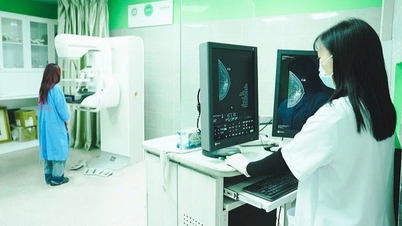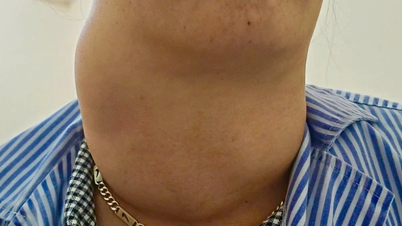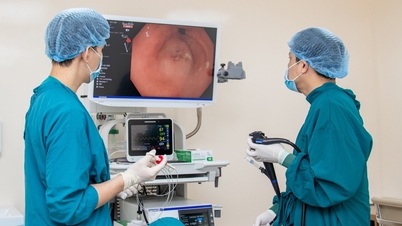GĐXH - According to research, red apples contain many nutrients and have many health benefits. However, eating them incorrectly can have the opposite effect.
What is the effect of red apple?
Red dates are also known as jujubes. Red dates are dried and used in cooking and traditional medicine. The reason red dates are called that is because they are most commonly grown in China, especially in the provinces of Hebei, Xinjiang, Sichuan, Yunnan... In addition, red dates are also grown in Korea and Japan.
Oriental medicine believes that dried red apples have the effect of strengthening the spleen and stomach, benefiting qi, generating body fluids, strengthening strength, penetrating, enriching blood, calming the nerves, detoxifying, and regulating other drugs.
Dried red apples treat spleen and stomach weakness, diarrhea, poor appetite, anxiety, physical weakness, restlessness, insomnia, skin ulcers, constipation, and stuffy nose.
According to modern research, red apples contain low calories but provide many nutrients for the body such as: flavonoids, polysaccharides and triterpenic acids... They can help strengthen the immune system, reduce inflammation, improve liver function and support muscle strength. In addition, red apples also provide minerals such as potassium, phosphorus, calcium, magnesium and complex B vitamins. With low calories and high fiber, red apples are also an important part of a balanced diet and help maintain a stable weight.

Red dates are dried and used in cooking and traditional medicine.
Effects of red apples
Strengthen the immune system
Because red apples are rich in vitamin C, they can help the body fight off external pathogens. Vitamin C helps boost immunity, protecting the body from flu, infections and many other diseases.
Support the digestive system
The effects of red apples are not only on the immune system but also help improve digestive function. The high fiber content in red apples helps the digestive system work effectively, reducing the risk of constipation and other digestive problems. The fiber in red apples also helps balance intestinal bacteria, enhancing the body's absorption of nutrients.
Helps improve sleep
Jujube fruit and seed extracts have been shown to increase sleep duration and sleep quality. Additionally, jujube is commonly used in traditional medicine to help people with insomnia and anxiety disorders.
Enhance memory
The anti-inflammatory and antioxidant compounds in jujubes have the ability to protect the brain and support memory enhancement. Research has shown that extracts from jujube components can help treat Alzheimer's disease in animals. Additionally, jujube seed extract has been published in the journal Ethnopharmacology to reduce symptoms of anxiety disorders at low doses.
Skin care
Red apples with vitamin C are powerful antioxidants, helping to brighten the skin and reduce wrinkles effectively. In addition, the flavonoid antioxidants in red apples also protect the skin from the risk of aging caused by free radicals.
Helps improve heart health and blood pressure
Red apples provide potassium, manganese, flavonoids, triterpenoids and polysaccharides, which can help improve blood vessels, control blood pressure and support the treatment of cardiovascular disease.
Support kidney function
The creatinine and urea levels in jujubes have been shown to improve kidney function. This is especially important for patients undergoing kidney treatment. Regularly consuming a moderate amount of jujubes every day can help improve the condition and improve health.
Enhance blood circulation
According to traditional Chinese medicine, jujube is considered a warm medicine, which has the effect of strengthening the spleen, replenishing qi and generating body fluids. These properties help the spleen and stomach function better, improve blood circulation and relieve symptoms such as loss of appetite and diarrhea. Jujube also helps treat blood disorders and coughs, making the body healthier.
Good for the fetus
Pregnant women who regularly drink red apple juice can receive many significant benefits. The high content of vitamin C and vitamin E in red apples helps improve the skin, making the pregnant woman's skin brighter, smoother and healthier.
Red apples also help replenish blood, support blood circulation, and prevent anemia in pregnant women. Drinking red apple juice also helps prevent colds and strengthen the immune system for both mother and baby, thanks to the rich and safe nutrients in this fruit.
Prevent cancer, protect liver
Red apples contain a rich amount of vitamin C, which has been shown in many studies to have the ability to protect the liver. Vitamin C is a powerful antioxidant that helps prevent the negative effects of free radicals on the liver, protecting liver cells from damage.
Dried red apples contain many flavonoids, these compounds not only help improve overall health but also have antioxidant properties, minimizing the risk of cancer by neutralizing free radicals in the body.

Using red apples properly is very good for your health.
How to use red apples properly?
After waking up: When waking up, the body is often dehydrated. Drinking a cup of red apple juice immediately will help restore energy, purify the body and support the treatment of high blood pressure. In addition, drinking red apple tea also helps to stay awake, increase concentration and readiness for work and study.
After eating greasy food: When consuming a lot of greasy food, you may feel heartburn and indigestion. A cup of red apple juice will aid the digestive system, preventing food from stagnating in the stomach.
Before going to bed: Drink red apple juice about 30 minutes before going to bed. In the evening, you should use red apple juice mixed from the second or third water to make the tea weaker, helping to avoid insomnia.
However, although red apples are good for health, these fruits are quite sweet. If eaten in large quantities, it can lead to unwanted weight gain. A healthy person should only eat about 5 fresh red apples and 3-5 dried red apples per day.
Jujubes may interact with antidepressants, so those taking these medications should avoid eating jujubes. Those taking anticonvulsants such as phenytoin, phenobarbital, and carbamazepine should consult their doctor before eating jujubes. The substances in jujubes may enhance the effects of these medications.
People with diabetes should not eat red apples regularly, especially dried ones, because red apples can increase blood sugar after eating.
People with bloating, flatulence, nosebleeds, toothache, acne, and rashes should not eat red apples.
Source: https://giadinh.suckhoedoisong.vn/tao-do-vi-than-duoc-doi-voi-suc-khoe-nhung-an-theo-cach-nay-lai-gay-phan-ung-nguoc-172250222100950804.htm






![[Photo] Solemn opening of the 8th Congress of the Central Public Security Party Committee, term 2025-2030](https://vphoto.vietnam.vn/thumb/1200x675/vietnam/resource/IMAGE/2025/10/4/f3b00fb779f44979809441a4dac5c7df)
![[Photo] Bustling Mid-Autumn Festival at the Museum of Ethnology](https://vphoto.vietnam.vn/thumb/1200x675/vietnam/resource/IMAGE/2025/10/4/da8d5927734d4ca58e3eced14bc435a3)


























![[Photo] General Secretary To Lam attends the 8th Congress of the Central Public Security Party Committee](https://vphoto.vietnam.vn/thumb/1200x675/vietnam/resource/IMAGE/2025/10/4/79fadf490f674dc483794f2d955f6045)






















![[VIDEO] Summary of Petrovietnam's 50th Anniversary Ceremony](https://vphoto.vietnam.vn/thumb/402x226/vietnam/resource/IMAGE/2025/10/4/abe133bdb8114793a16d4fe3e5bd0f12)

![[VIDEO] GENERAL SECRETARY TO LAM AWARDS PETROVIETNAM 8 GOLDEN WORDS: "PIONEER - EXCELLENT - SUSTAINABLE - GLOBAL"](https://vphoto.vietnam.vn/thumb/402x226/vietnam/resource/IMAGE/2025/7/23/c2fdb48863e846cfa9fb8e6ea9cf44e7)






































Comment (0)